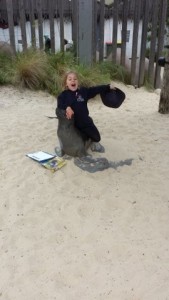At Tyabb Primary School, we believe that the best strategy to teach the humanities subjects such as history, geography and economics is through an inquiry based approach. In this, the digital age, information is quite literally at our students’ fingertips. With the click of a computer keyboard, students have access to knowledge far beyond what was available to their parents and grandparents. With new innovations, knowledge is continually changing and growing. Therefore, teachers are no longer the provider of all knowledge but rather the facilitator who assists students to discover their own information. Inquiry based learning allows students to have a choice in what, how or with whom they learn. With an Inquiry based approach, the role of teachers is to help students understand the skills of research. Skills such as identifying reliable sources, writing information in their own words, digital literacy skills, excellent communication skills, understanding of copyright, editing and much more.
All students at Tyabb Primary School go through the process of Inquiry learning. The first stage is called ‘Tuning In’, followed by ‘Finding Out’, then ‘Sorting Out’, next comes ‘Going Further’ and finally ‘Drawing Conclusions’.
Tuning In
Teachers explain the essential question, focus the students on the skills and values needed to be successful. Students are engaged in the learning through excursions, video clips, reading, models and other means. At this stage, prior knowledge is gathered.
Finding Out
Students develop their own questions which they would like to research. Teachers give students experience that add to their knowledge base. Information is gathered through research, observations and experiences. Literacy skills and research skills are developed as students use a variety of sources.
Sorting Out
At this stage, useful data is collated, information gathered is organized, analyzed and shared. Teachers assist student to sort out their findings and communicate them to an agreed audience through thinking and processing tools.
Going Further
Students reflect on their learning and have a chance to take it further. There may be opportunities for independent inquiries to pursue further questions or areas of interest. Students may work individually, in pairs or in groups.
Drawing Conclusions
This is time that students can celebrate their new understanding. This may involve a presentation to other students or parents. It could involve a family night, school expo or much more. At this stage, students are given opportunities to self-assess, complete peer-assessments, reflect and evaluate. This is the time for students to demonstrate their progress. Students may have an assessment to complete and will articulate what they think and know and how their understandings have changed.
The inquiry process allows students to have more say in their learning and therefore become more engaged. It fosters life-long learners. Through hands-on tasks, research based information gathering, learner choice, problem-solving solutions and real life learning, students improve their ability to find out things for themselves, rather than relying on adults to tell them. Students are given opportunities to build upon, test, share and reflect on their knowledge and learning. Inquiry learning is a powerful tool which enables students to learn for themselves, now and in the future.
Grade ones, ‘tuning in’ at the zoo. Students started off their Inquiry unit with a visit to the zoo to get them thinking about animals and their habitats.




